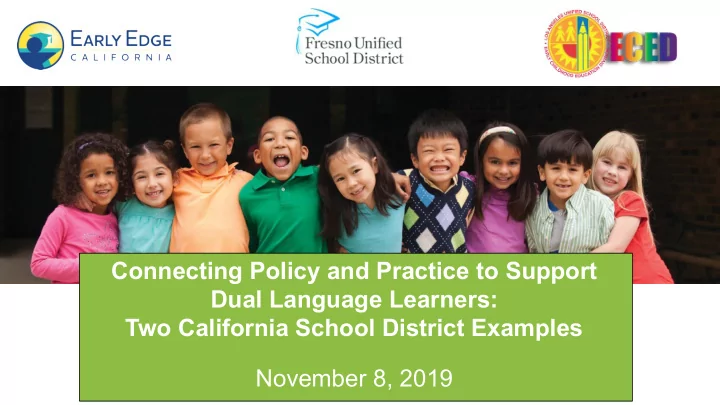

Connecting Policy and Practice to Support Dual Language Learners: Two California School District Examples November 8, 2019
Agenda ● Introductions/Overview ● Who are Dual Language Learners (DLLs)? ● Overview of DLL Research & State Policies ● Overview of 2 Key Programs ● Audience Q&A #EarlyLearningPanel2019 #acsasummit
Introductions/Overview #acsasummit
Presenters Dean Tagawa Patricia Lozano Carolyne Crolotte Deanna Mathies Early Edge California Early Edge California Fresno Unified Los Angeles Unified School District School District #acsasummit #EarlyLearningPanel2019
Who are Dual Language Learners? ▪ Dual Language Learner (DLL) refers to children, birth to age 5, who are learning two (or more) languages at the same time. Source: U.S. Office of Head Start #acsasummit
Why Should We Focus on DLLs? Sources: Pompa, Delia, Maki Park, and Michale Fix. 2017. New Opportunities? ESSA and its implications for Dual Language Learners and ECEC Workforce Development. Washington DC: Migration Policy Institute; Park, Maki, Anna O'Toole, and Caitlin Katsiaficas. 2017. Dual Language Learners: A Demographic and Policy Profile for California. Washington, DC: Migration Policy Institute.
Achievement Gap On average, DLL children enter kindergarten behind their peers in language, literacy, and math. Other than parents, teachers have the most significant and long-lasting impact on a child’s educational trajectory. Sources: U.S. Department of Health and Human Services & U.S. Department of Education Policy Statement on Supporting the Development of Children Who Are Dual Language Learners in Early Childhood Programs (2017) AIR 2017 Research Brief “Transitional Kindergarten in California: The Impact of Transitional Kindergarten on English Learner Students” #acsasummit
Most Teachers/Providers Have Not Received DLL-Specific Training Research shows that without specific training, teachers are not adequately prepared to teach DLL children Not Completed Sources: Center for the Study of Child Care Employment, University of California at Berkeley & California Child Care Resource and Referral Network, California Early Care and Education Workforce Study: Licensed Child Care Centers and Family Care Providers, Los Angeles County (2006); NASEM Report Promoting the Educational Success of Children and Youth Learning English: Promising Futures (2017) #acsasummit
English Learner (EL) Statistics ● ELs make up 20% of California’s K-12 public education system, totaling 1.3M students. ● In 2018, nearly 90% of ELs across all grades in California did not meet English and math standards. ● 4 in 10 of California’s K-12 students are current or former ELs. #acsasummit
Overview of DLL Research #acsasummit
• Children are wired to learn any language and can successfully learn more than one language • Strong home language supports learning English and academic achievement • Learning two languages is associated with improved cognition, executive function and social interactions #acsasummit
Early Years: Critical Period for Language Learning
Key Research Findings • Early and continuous English AND home language development in high-quality early childhood programs can help reduce the achievement gap • DLLs are at risk of losing their home language , reducing levels of competence, and advantages associated with bilingualism, if home language is not supported in Early Learning settings. • What is known about high-quality ECE in general is the foundation for effective practices for DLLs. However, that basic high-quality ECE instruction must be enhanced to meet the unique linguistic and developmental needs of DLLs.
Overview of State Policies #EarlyLearningPanel2019 #acsasummit
Recent Policies that Support Bilingualism/DLLs Proposition 58 – ( Education for a Global Economy initiative) passed by voters in November 2016 (73.5%) The California English Learner Roadmap Policy – adopted by the State Board of Education in July 2017 The State Seal of Biliteracy Global California 2030 #acsasummit
California English Learner Roadmap Small Group Conversations English Learner Roadmap Early childhood to 12 th grade policy ● ● Aligned with state priorities, policies and current research ● Bilingualism & biliteracy as a goal ● DLL/EL students are the shared responsibility of all educators #acsasummit
The Benefits of Dual Language Programs in the Early Years #acsasummit
Overview of 2 Key Programs #acsasummit
Fresno USD Language Learning Project Not Completed #acsasummit
Fresno USD Language Learning Project Slide# 3 Placeholder text Not Completed #acsasummit
Fresno USD Language Learning Project Not Completed #acsasummit
Language Learning Project COMPONENTS Not Completed #acsasummit
LAUSD Dual Language Program Pilot ● Supported by the White House Report on Dual Language Learners ● Support from board members and district senior leadership ● Developing a board resolution Not Completed ● Learning from others ● Thoughtful investments #acsasummit
LAUSD Dual Language Program Pilot Highly collaborative process ● Partnerships ● Securing Funding ● On-going support Workforce development ● Training for all Not Completed ● Full cycle professional development ● Resources #acsasummit
LAUSD Dual Language Program Pilot Students at the center ● Alignment ● Culturally relevant ● Resources ● Developmentally appropriate ● Pathways to the seal of Not Completed biliteracy #acsasummit
Questions? #acsasummit
Thank You! Photo Credits: Melissa Kobe Charlie Kaijo istock #acsasummit
Recommend
More recommend